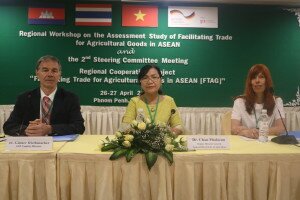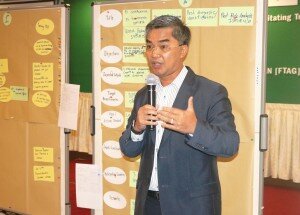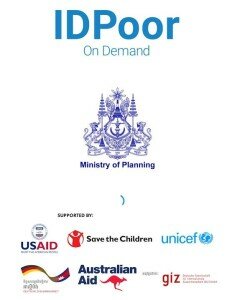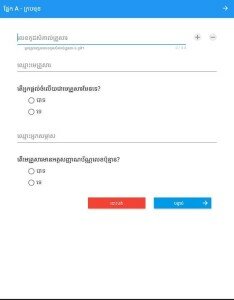How digital solutions facilitate the identification of poor households in Cambodia
When poverty hits, people struggle to even afford their basic needs. Getting nutritious food and clean drinking water can be a challenge, compromises on education might have to be made. It can be devastating, especially when one encounters health issues.
To tackle poverty and identify those in need for support the Cambodian government with the support of its partners, Germany and Australia, implements a unique solution: IDPoor. …
How digital solutions facilitate the identification of poor households in Cambodia
When poverty hits, people struggle to even afford their basic needs. Getting nutritious food and clean drinking water can be a challenge, compromises on education might have to be made. It can be devastating, especially when one encounters health issues.
To tackle poverty and identify those in need for support the Cambodian government with the support of its partners, Germany and Australia, implements a unique solution: IDPoor.
aimer
IDPoor aims to reduce poverty
Since 2006, the Ministry of Planning (MoP) of the Royal Government of Cambodia implements a poverty identification mechanism called Identification of Poor Households (IDPoor). It is part of the Royal Government of Cambodia’s ongoing efforts to reduce poverty and support socio-economic development throughout the country. IDPoor uses a hybrid model to combine the objectivity of a proxy means test survey with the accuracy and affordability of a community-based selection process. The programme provides regularly updated information on poor households to many governmental and non-governmental agencies to help them target services and assistance to the poorest and most vulnerable households.
The implementation of the regular IDPoor process requires substantial human, financial and time resources to which the current government capacity is not able to accommodate. For this reason, the government is only able to reach eight provinces per year in the regular IDPoor process, causing a three-year waiting period before the same province is reassessed. For eligible families who were either absent or not identified in their respective round, or families falling into poverty in between rounds, the waiting period for the next IDPoor round can be too long.
A new on-demand identification process and use of new technologies help reaching even more poor households
As a response to these concerns, the MoP with support from GIZ has developed an On Demand Identification Mechanism (OD-IDPoor) to assess families that could not be identified during the regular identification process. The OD-IDPoor mechanism is triggered on-demand by the local level and intends to make IDPoor more dynamic and flexible.
MoP is carrying out a pilot over a period of 12 months (01/2018 – 01/2019) in the three target provinces: Tboung Khmum, Ratanakiri and Battambang.
OD-IDPoor makes use of innovative technological solutions: A digital tool allows local implementers at commune level to manage new requests, carry out interviews to determine the poverty status and print out IDPoor cards using a tablet. Data is automatically transferred to the National IDPoor database. The application has been designed for users with low IT literacy. The potential advantages are compelling: Using smart devices for data collection not only makes the process faster and more flexible but might also improve quality of data and save costs. Entering questionnaire data directly into a device makes data immediately available, saving time and costs of data entry and printing paper forms. Error messages, skip logic, and automatic score calculations simplify the process and reduce errors. Assessing these assumptions and the ability of local implementers to use these new technologies is part of the pilot implementation. Since the IDPoor process is community-driven, there was concern that if key steps in the IDPoor process require digital skills of local implementers, this might limit the participation of a significant portion of villagers. Hence, the merits of ‘quick and digital’ should not necessarily be prioritised over the value of ‘inclusive and participatory’ – IDPoor strives for a combination of both in order to maximise benefit and minimise error and cost, in line with government and community priorities.
The IDPoor Programme is supported by the German Federal Ministry for Economic Cooperation and Development (BMZ) and the Australian Department of Foreign Affairs and Trade (DFAT), implemented by Deutsche Gesellschaft für Internationale Zusammenarbeit (GIZ) GmbH. The development of the OD-IDPoor App was supported by Save the Children Cambodia on behalf of United States Agency for International Development (USAID) and UNICEF.
– by GIZ IDPoor
aimer
Fresher and safer exported fruit and vegetable for consumers, easier work for border check officers, and increase of export earnings among Cambodia, Thailand, and Vietnam

Welcome and opening remarks by Dr. Chan Phaloeun, Deputy Director General Directorate of Agriculture (GDA), Ministry of Agriculture,Cambodia
20 June 2018
Consumers in Cambodia, Thailand, and Vietnam will enjoy fresh and safe fruit and vegetable while the three countries will benefit the better trade flow of agriculture goods, and hopefully an increase of agricultural exports and revenues among the three countries. Additionally, officers at the three border check points for food safety and phytosanitary measures will find it easier to work.
The Project of the Facilitating Trade for Agricultural Goods in ASEAN (FTAG) has initiated the Regional Study on “Assessment of Framework Conditions for Trade in Fresh Fruits and Vegetable in Cambodia, Thailand and Vietnam” with specific emphasis on trade in … More >>>
Fresher and safer exported fruit and vegetable for consumers, easier work for border check officers, and increase of export earnings among Cambodia, Thailand, and Vietnam

Welcome and opening remarks by Dr. Chan Phaloeun, Deputy Director General Directorate of Agriculture (GDA), Ministry of Agriculture,Cambodia
20 June 2018
Consumers in Cambodia, Thailand, and Vietnam will enjoy fresh and safe fruit and vegetable while the three countries will benefit the better trade flow of agriculture goods, and hopefully an increase of agricultural exports and revenues among the three countries. Additionally, officers at the three border check points for food safety and phytosanitary measures will find it easier to work.
The Project of the Facilitating Trade for Agricultural Goods in ASEAN (FTAG) has initiated the Regional Study on “Assessment of Framework Conditions for Trade in Fresh Fruits and Vegetable in Cambodia, Thailand and Vietnam” with specific emphasis on trade in mango, longan, lychee, dragon fruit, banana and chili. The objective of the study is to provide overview of the current trade situation and conditions and to identify potential obstacles, and gaps, as well as recommendations to improve and facilitate better trade in the three countries. Integral part of the regional study are three country specific studies.
The country results as well as the regional studies were recently presented in Phnom Penh, Cambodia at the Regional Workshop on the Assessment Study of Facilitating Trade for Agricultural Goods in ASEAN and the 2nd Steering Committee Meeting on 26-27 April 2018.
The event served as a platform to present and discuss findings of the national and regional studies and to agree on activities in the field of phytosanitary measures and food safety to overcome trade facilitation obstacles of the selected six agricultural commodities in the three countries. Twenty-three participants including Steering Committee Members and technical officers from Cambodia, Thailand and Vietnam attended this event.
In the 1st Steering Committee Meeting on 11 – 12 October 2017 held in Bangkok, Thailand, the assessment study on regulatory framework and procedures to identify existing challenges, barriers, gaps and recommendations had been agreed, and the six proposed potential crops had been selected.

Presentation on prioritizing of national activities by Dr. Ker Monthivuth, Director of the Dept. of Plant Protection Sanitary and Phyto-sanitary,
Within ASEAN approximately only 30 percent of trade takes place between the Member States. In general, the level of intra-ASEAN trade is low. Trade in agricultural goods (fruits and vegetables) between Cambodia, Thailand and Vietnam is significantly higher compared to other ASEAN Member States. However, gaps in the regulations on food safety and phytosanitary measures are hindering and slowing down the trade flow of agricultural goods.
Trade facilitation through the simplification of trade procedures can help reducing time and costs to move goods across borders. This will provide advantages for producers and traders by increasing the competitiveness.
Therefore, the Global Trade Fund for Development commissioned by the German Federal Ministry for Economic Cooperation and Development (BMZ) and implementing by Deutsche Gesellschaft für Internationale Zusammenarbeit (GIZ) GmbH in collaboration with country partner agencies, i.e. the Ministry of Agriculture, Forestry and Fisheries (MAFF), Cambodia, the Ministry of Agriculture and Cooperatives (MOAC), Thailand and the Ministry of Agriculture and Rural Development (MARD) in Vietnam.
For more information, please contact:
- Ra Ten, Technical Advisor of FTAG project
Email:
- Chorlida Leng, Junior Advisor of FTAG project
Email:
aimer




